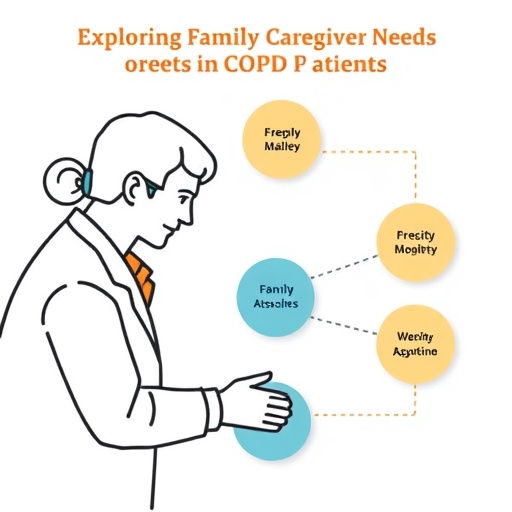As healthcare systems evolve, the spotlight increasingly shines on the multifaceted roles that family caregivers play in the support of patients with chronic conditions, particularly those suffering from chronic obstructive pulmonary disease (COPD). This condition, characterized by persistent respiratory symptoms and airflow limitation, not only impairs the quality of life for patients but also places a considerable burden on their family members, who often assume the role of caregivers. In a groundbreaking scoping review protocol set for publication in the journal BMC Nursing, researchers Farahani, Soltani-Arabshahi, and Kashani take a closer look at the specific needs of these caregivers, aiming to map the existing gaps in resources, support systems, and information available to them.
The gravity of chronic obstructive pulmonary disease extends beyond the individual, as it transforms family dynamics and places immense emotional and physical strain on those tasked with care. Caregivers often experience psychological distress, social isolation, and a decline in their own health, making it imperative to understand their unique challenges and requirements. The research team’s work stands at the intersection of patient care and caregiver support, an area that has gained increasing recognition as vital to comprehensive healthcare.
Initial literature suggests that caregivers of COPD patients face a myriad of challenges. These challenges include managing complex medical needs, navigating healthcare systems, and providing emotional support, all while balancing their personal and professional lives. The researchers intend to conduct a thorough scoping review to identify specific areas where caregivers feel they lack adequate resources and knowledge. By evaluating existing studies and frameworks, they will compile a comprehensive overview that highlights not only the needs but also potential interventions that could alleviate caregiver burdens.
In this scoping review protocol, the research team outlines a systematic approach to searching for relevant literature across various databases. This methodical strategy is designed to ensure the inclusion of diverse perspectives and findings. The goal is to create a holistic panorama of the caregiver landscape, taking into account cultural, geographic, and socioeconomic variables that may influence experiences. With this extensive review, they aim to inform better support strategies catered specifically to family caregivers of COPD patients.
The review will also emphasize the importance of emotional and psychological support services for caregivers. Qualitative studies have shown that negative psychological outcomes, such as anxiety and depression, are common among caregivers due to the relentless demands of their roles. The researchers will explore interventions that could provide emotional relief and coping strategies for stress management. By identifying existing programs and literature that have successfully addressed these needs, they can recommend evidence-based practices that healthcare providers could implement.
Moreover, this research will shed light on the educational needs of caregivers, an often-overlooked aspect of chronic disease management. Many caregivers report feeling ill-prepared to handle the medical intricacies related to COPD management, including medication administration, symptom monitoring, and emergency response. By identifying gaps in education and training resources, the study aims to inform curriculum development and healthcare provider training, which would ultimately empower caregivers in their roles.
The implications of this scoping review extend beyond the immediate family context. Policymakers, healthcare institutions, and community organizations are increasingly recognizing the critical role caregivers play in the healthcare system. Integrating caregiver support into public health strategies is essential for improving outcomes not only for patients but also for those who care for them. This review could provide the data necessary to advocate for more robust policies that recognize and support caregivers as essential members of the healthcare team.
The researchers anticipate that their findings will stimulate further studies focused on caregiver well-being, catalyzing a shift in how healthcare systems approach family involvement in chronic disease management. Their ongoing work highlights an urgent call for a cultural shift within healthcare, one that encompasses a broader understanding of patient care as inclusive of family dynamics.
As the research progresses, the authors will seek input from a diverse set of stakeholders, including caregivers themselves, healthcare providers, and community advocates. In doing so, they aim to create a participatory research model that centers the voices of those directly affected by the issues at hand. This collaborative approach fosters a more nuanced understanding of caregiver needs and strengthens the evidence base for effective interventions.
The overarching goal of the proposed study is to synthesize existing knowledge while paving the way for new research initiatives to explore the identified needs in greater depth. By capturing the lived experiences of family caregivers, the study aspires to contribute to a growing body of literature that emphasizes empathy, support, and resource allocation in chronic disease care.
In conclusion, this scoping review protocol marks a significant step forward in understanding and addressing the critical needs of family caregivers for COPD patients. By shining a light on these often-overlooked individuals, the researchers hope to not only improve caregiver well-being but also enhance the quality of care provided to patients. The ultimate vision is to create a healthcare environment where caregivers feel valued, supported, and equipped to fulfill their essential roles, leading to better health outcomes for all involved.
In an era where chronic diseases are increasingly prevalent, the importance of caregiver support cannot be overstated. As this research moves forward, it stands to catalyze changes in both perception and policy that can significantly impact the lives of millions of caregivers and the patients they serve.
Subject of Research: The needs of family caregivers of patients with chronic obstructive pulmonary disease.
Article Title: The needs of family caregivers of patients with chronic obstructive pulmonary disease: a scoping review protocol.
Article References:
Farahani, M.A., Soltani-Arabshahi, S.K. & Kashani, M. The needs of family caregivers of patients with chronic obstructive pulmonary disease: a scoping review protocol.
BMC Nurs 24, 1313 (2025). https://doi.org/10.1186/s12912-025-03948-3
Image Credits: AI Generated
DOI:
Keywords: Family caregivers, Chronic obstructive pulmonary disease, Scoping review, Caregiver support, Healthcare system, Emotional well-being, Educational resources.




